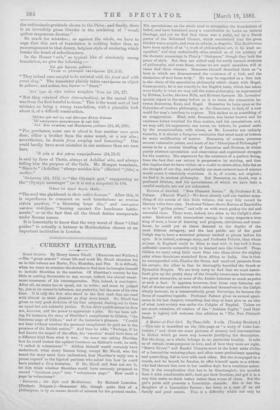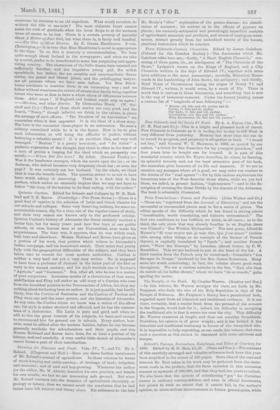A Matter - of - Fact Girl. By Theo. Gift. 3 vols. (Tinsley Brothers.)
—This tale is described on the title-page as " a story of Lake-Lan- cashire ;" and there are some pictures of scenery and conversations in dialect which go some way towards justifying the description. But the story, as a whole, belongs to no particular locality. It tells us' of certain cross-purposes is love, and of how they were set right. "Berrie Brown" and Randal Comyns meet at the hotel table d'hoto of a Lancashire watering-place, and after some preliminary sparring and quarrelling, fall in love with each other. But she is engaged to a cousin, and he bound, he fancies, to offer himself again to a widow, who had thrown him over in her maiden days for a wealthier suitor. This is the complication that has to be disentangled; the novelist does it with considerable skill; both get their freedom, and got it in a way that make us think better rather than worse of them. But the girl's pride still presents a formidable obstacle. She is but the daughter of a Lancashire farmer ; her lover is a man of an old family and good estate. This is a difficulty which can only be overcome by recourse to an old expedient. What would novelists do without the tide or sea-mist ? The most obdurate heart cannot resist the rush of gratitude when the lover drops in at the moment when all seems to be lost. There is a certain poverty of material about A Matter-of-Fact Girl, but what there is, is fairly well handled. —The Glen of Silver Birches. By E. Owens Blackburne. 2 vols. (Remington.)—It is tree that Miss Blackburn's novel is appropriate to the time. To us, this is scarcely a recommendation. We hear quite enough about Ireland in the newspapers ; and when we take up a novel, prefer to be 'transferred to some less perplexing and aggra- vating country. The characters of the little drama hero enacted are sufficiently familiar, and the impulsive young girl, the selfish spendthrift, her father, the too sensible and unsympathetic Saxon settler, the genial and liberal priest, and the pettifogging lawyer, are all persons whom wo have seen before. Yet Miss Black- burne continues to combine them in an interesting way ; and we follow without weariness the course of events that finally bring together lovers who seem at first to have a whole abyss of differences between them. Adeit omen ! If England and Ireland could only so agree ! —Mericas, and other Stories, By Clementine Black. (W. Sat- chell and Co.)—Three of these short stories are very good, and the fourth, "Toney," though inferior, we think, to the others, is above the average of such efforts. "The Troubles of an Automaton" we remember when it first appeared. It is the ideal of a short story. The hero is the concealed chess-player in an automaton. He sees a robbery committed while ho is in the figure. How is be to give such information as will bring tho offender to justice, without betraying a valuable secret ? It is an excellent idea, and very well managed.' " Merlons " is a pretty love-story, and "An Artist" pathetic expression of the thought that there is often in the heart of a man of genies a longing for the ideal which no prosperity can satisfy.--Whom Did She Love ? By Adair. (Samuel Tinsley.)— Was it the handsome stranger, whom she meets upon the ice ; or the footman, who indeed becomes very desperate about her ; or even the page P It was certainly not her husband. On the whole, we think that it was the brandy-bottle. The question seems to us not to have been• worth asking or answering. There is a dark hint in the preface, which makes us earnestly implore that we may not have to follow "the story of the heroine to its final ending, with the author."



































 Previous page
Previous page